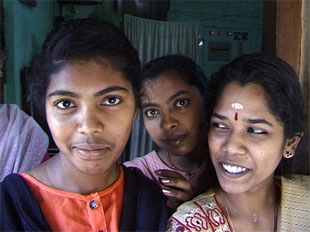
Indian Diary — Days At Sree Sankara
168 minutes, BetaSP, 4:3, colour, PAL
In his new film Indian Diary — Days at Sree Sankara — the Austrian filmmaker Michael Pilz sticks to his principles; to watch his object so long that they initiate the conversation. He is an extremist in perception, a prompter for the little things. In an introduction to a seminar that Michael Pilz gave in 1994 at the College for design in Dortmund, Germany, the headliner was of the essence of a film: To free oneself of the „object of desire“ through the sensitising of ones own perceptual yearnings. Content follows form. Observe until the things speak for themselves. These are the perceptive and aesthetic paradigm that run through the approximately fifty works of the Austrian motion-, documentary- and experimental filmmaker since the mid 60’s. His five hour opus Heaven And Earth (1982) shows the arcaic life of a small mountain community in Styria, Austria. Here his film perception and narrative tempo are adapted to the inhabitants who live with the cycle of seasons. Pilz has a Laotian proverb „Take what is before you as it is, don’t wish for anything else, just carry on“. Let things happen as they occur. Don't focus attention on something, just be attentive; the eye of the camera as vigil registrar of the moment which forgets its own existence. As in Pieces Of Dreams (1988/99) where Pilz observes the theater director Jack Garfein preparing a Beckett piece (Ohio impromptu) in his hotel room. The room is filled with dialogue and concentration, the manic repetitions of a single text fragment gives way to long passages of tense silence. For a while Pilz appears in the picture himself and becomes an impresario – part of the act in a chamber theatre formation – in that the documentary almost takes on fictional characteristics.
„Watching until the things start to talk“ also applies for Michael Pilz’s new film Indian Diary — Days at Sree Sankara; the chronical of the wellness stay of the filmmaker in the southern Indian small town Changanacherry. It is a sampling of perceptual fragments which follow the drama of an acclimation and the slow exploration of the area around the hospital of Sree Sankara. The long static adjustment from the clinic room, the view from the veranda, the trees in the garden, swing into action with the first trip to town. The shots from the moving rikshaw are reminiscent of Jacques Tatis' Traffic. Soon the nurses walk into the scene and become fixed members of an ensemble which appear throughout the film. Occasionally they even take over the actual filming – first hesitatingly, then with increasing self assurance. They describe a few pages of this diary through their camera style in a very personal manner. Every day rituals are seen – massages, cleansings and meditation – and one slowly begins to find an orientation, even with Pilz himself. Yet once again the frame freezes and shows a precisely organized still life of town and nature. Audiovisual contemplations of almost tactile intensity which let inner and outer perceptions fuse.
This film seems to amaze itself with an almost naive view – without the usual ethnographic or touristic perceptions filter whether it be an grazing elephant being filmed minutes long or a man who handles glowing coals in his bare hands. All observations, even the more unspectacular are given equal footing and don’t compete to get the first place in the photo album. Whoever looks long and hard enough won’t need a photo, and if the things start to speak for themselves, then no one needs to talk about them either. Or as Jack Garfein says at the end of Pieces Of Dreams: „There’s nothing left to tell“.
Mark Stöhr,
Nothing left to tell,
SCHNITT – Das Filmmagazin, No. 23, Bochum/Germany,
March 2001
» ![]() Additional articles, reviews & photo galleries (pdf, 1,7Mb)
Additional articles, reviews & photo galleries (pdf, 1,7Mb)
Original title Indian Diary — Days At Sree Sankara
English title Indian Diary — Days At Sree Sankara
Produced by Michael Pilz
Concept and realization by Michael Pilz
Cinematography by Michael Pilz, and women from the Sree Sankara Ayurveda Hospital
Original sound by Michael Pilz
Edited by Michael Pilz
Filmed on original locations in and around Sree Sankara Ayurvida Hospital in Changanacherry, Kerala, Southern India » www.sreesankara.com
Austria 2000
Language Malayalam, English, German
Intentionally no subtitles
First public screening 1 February 2001, International Filmfestival Rotterdam
Festivals Rotterdam (NL), Graz (AT), Vienna (AT), Riga (LV), a.o.
Copyright by Michael Pilz Film
A-1180 Vienna/Austria
Teschnergasse 37
Phone +43.699.11336581